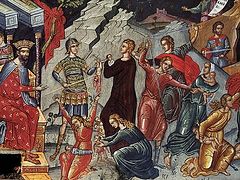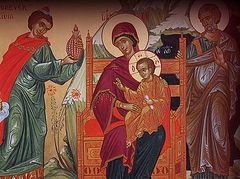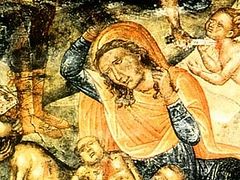Today’s Gospel reading very edifyingly recounts for us the Holy Family’s flight into Egypt. The Evangelist Matthew says:
And when they [the Magi] were departed, behold, the angel of the Lord appeareth to Joseph in a dream, saying, Arise, and take the young child and his mother, and flee into Egypt, and be thou there until I bring thee word: for Herod will seek the young child to destroy him. When he arose, he took the young child and his mother by night, and departed into Egypt: And was there until the death of Herod: that it might be fulfilled which was spoken of the Lord by the prophet, saying, Out of Egypt have I called My Son. Then Herod, when he saw that he was mocked of the wise men, was exceeding wroth, and sent forth, and slew all the children that were in Bethlehem, and in all the coasts thereof, from two years old and under, according to the time which he had diligently inquired of the wise men. Then was fulfilled that which was spoken by Jeremiah the prophet, saying, In Rama was there a voice heard, lamentation, and weeping, and great mourning, Rachel weeping for her children, and would not be comforted, because they are not. But when Herod was dead, behold, an angel of the Lord appeareth in a dream to Joseph in Egypt, Saying, Arise, and take the young Child and his mother, and go into the land of Israel: for they are dead which sought the young Child’s life. And he arose, and took the young Child and His mother, and came into the land of Israel. But when he heard that Archelaus did reign in Judaea in the room of his father Herod, he was afraid to go thither: notwithstanding, being warned of God in a dream, he turned aside into the parts of Galilee: And he came and dwelt in a city called Nazareth: that it might be fulfilled which was spoken by the prophets, He shall be called a Nazarene (Mt. 2:13-23).
The flight of Jesus Christ into Egypt, undertaken by instruction of the angel of the Lord so that He wouldn’t be subject to the death planned by Herod, provides us with a guiding example on the paths of our lives. And similar things to what happened with our Savior, that is, dangers and persecution, can happen to us in various forms. When we foresee some danger to our life or a danger threatening our health or well-being, we needn’t go out to meet it recklessly. The holy law of God and sound reasoning inspire us to take care to preserve our lives and well-being as gifts of God, and oblige us to remove ourselves from the foreseen dangers. Of course, our highest moral duties may demand otherwise, for the sake of which man must voluntarily sacrifice everything, even his own life. But when there are no such cases, then we must act as did the Savior—to not go to the danger, to avoid it as much as possible, not expecting any extraordinary providential actions of God from above for our salvation, but using those means we have at hand.
Some say: “Despite the dangers, I surrender to the will of God, and if it pleases God, He’ll preserve me.” But didn’t the Son of God have the means to save Himself from Herod? If He wanted, He could have called forth more than twenty legions of angels for His protection. Instead, He employed natural means: Carried by the elderly Joseph and His Mother, He fled, like the last of the sons of men, to Egypt and thereby saved Himself. That’s what we should do—use the natural means available to us, and not tempt the Lord with expectations of miracles and signs in our defense, which are never squandered uselessly.
Moreover, beholding the Divine Infant fleeing to Egypt, and contemplating what difficulties this journey entailed for Him and His Mother with the righteous elder, we must embrace the spirit of courage and patience. We must drive away the thought that’s instilled in us: “Why do we have these sorrows and tribulations? After all, they’re not intrinsic to our nature.” We have to know that anyone who wants to work for the Lord and serve Him must, according to the all-wise Sirach, prepare his soul for temptations (Sir. 2:1).
A true Christian is a warrior and ascetic, who will receive peace and a reward for his labors and podvigs, of which the Apostle Paul said: Eye hath not seen, nor ear heard, neither have entered into the heart of man (1 Cor. 2:9). But where does it await him? Not here, on earth, but there, in Heaven. Here there are many sorrows for the righteous (Ps. 33:20); and save your souls with your patience, says the Lord (Lk. 21:19).
Bearing all this in mind, let us perform our labor of salvation with patience, looking unto the author and finisher of our faith, the Lord Jesus—Who, instead of the glory that was due Him, suffered the flight into Egypt, giving no thought to humiliation. He thereby climbed the entire ladder of humiliation and suffering, and sat down at the right hand of the throne of majesty in Heaven (Heb. 12:1-2). To Him be the glory both now and ever and unto the ages of ages.
Amen.




